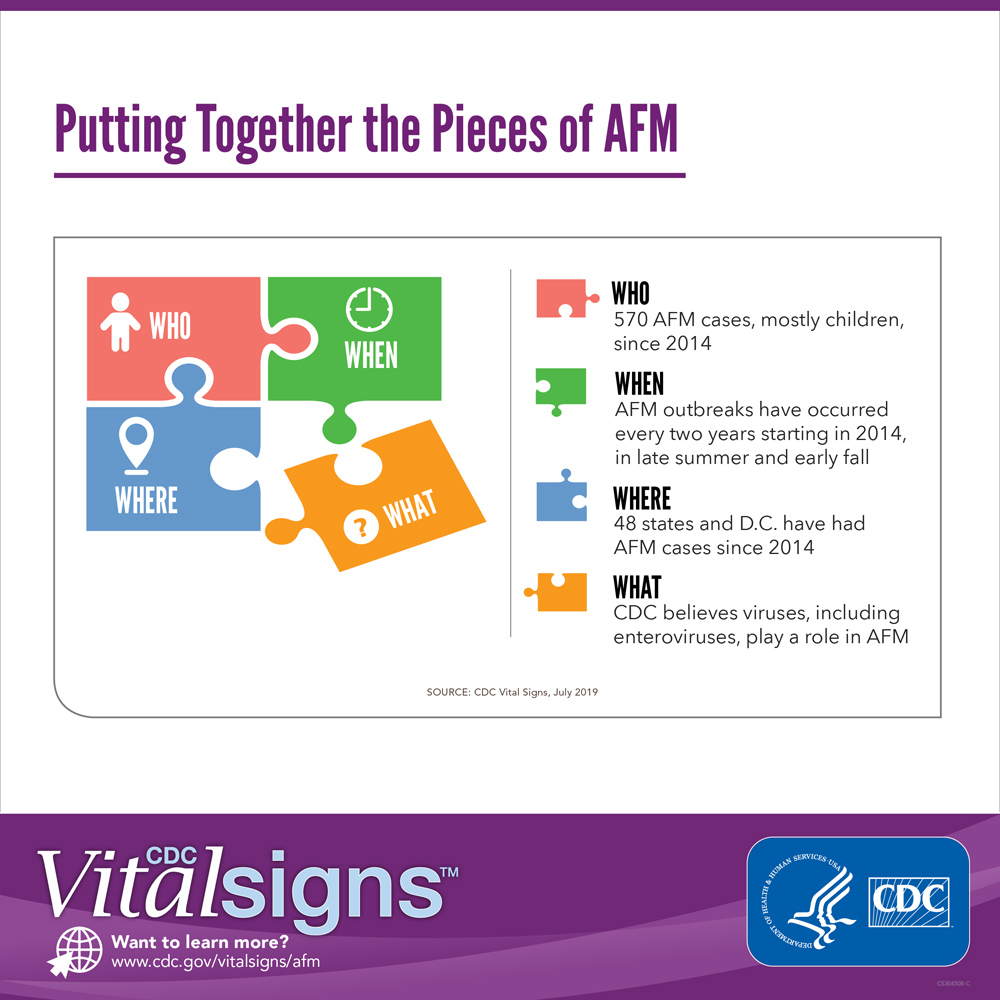CDC Urges Doctors to Rapidly Recognize and Report AFM Cases
Intense effort underway to understand and prevent this serious neurologic syndrome
Embargoed Until: Tuesday, July 9, 2019, 1:00 p.m. ET
Contact: Media Relations
(404) 639-3286
As the late summer/early fall “season” for acute flaccid myelitis (AFM) nears, CDC is calling on medical professionals to quickly recognize AFM symptoms and report all suspected cases to their health department. Early recognition and reporting are critical for providing patients with appropriate care and rehabilitation, and better understanding AFM, according to a new Vital Signs report.
The majority of AFM patients are previously healthy children who had respiratory symptoms or fever consistent with a viral infection less than a week before they experienced limb weakness. Since AFM can progress quickly from limb weakness to respiratory failure requiring urgent medical intervention, rapidly identifying symptoms and hospitalizing patients are important.
Dr. Robert Redfield, CDC Director
“CDC continues to pursue the definitive cause and mechanisms that define this disease and we sincerely appreciate the important contributions of the AFM Task Force in helping us get closer to critical answers,” said CDC Director Robert Redfield, M.D. “I urge physicians to look for symptoms and report suspected cases so that we can accelerate efforts to address this serious illness.”
Late summer and early fall is AFM “season”
CDC began tracking AFM in 2014, when the first outbreak of 120 cases occurred. Another outbreak occurred in 2016 with 149 cases, and again with 233 patients in 41 states in 2018– the largest outbreak so far. AFM cases have so far followed a seasonal and biennial pattern, spiking between August and October every other year.
In an analysis of cases confirmed in 2018, CDC detected enteroviruses and rhinoviruses in nearly half of respiratory and stool specimens. Of the 74 cases with a cerebral spinal fluid specimen, only two were positive for enteroviruses (EV-A71 and EV-D68). CDC and other scientists continue to investigate how enteroviruses, including EV-D68, might initiate AFM. All specimens tested negative for poliovirus, a related enterovirus that can cause AFM.

Dr. Tom Clark, deputy director, Division of Viral Diseases
“Our thorough investigation of AFM will help lead to more answers about this severe disease,” said Tom Clark, M.D., M.P.H, deputy director, Division of Viral Diseases. “We are monitoring AFM trends and the clinical presentation, conducting research to identify possible risk factors, using advanced lab testing and research to understand how viral infections may lead to AFM, and tracking long-term outcomes of AFM patients.”
CDC, with experts from the National Institutes of Health, academia, health departments, and parent advocacy groups, is committed to increasing awareness of AFM, and moving national priorities forward to advance our understanding of AFM and its prevention, treatment, and outcomes.
To read more about the Nationwide Outbreak of Acute Flaccid Myelitis—United States, 2018 and the entire Vital Signs report, visit www.cdc.gov/vitalsigns.
About Vital Signs
Vital Signs is a report that appears as part of the CDC’s Morbidity and Mortality Weekly Report. Vital Signs provides the latest data and information on key health indicators.
###
U.S. DEPARTMENT OF HEALTH AND HUMAN SERVICES
CDC works 24/7 protecting America’s health, safety and security. Whether disease start at home or abroad, are curable or preventable, chronic or acute, or from human activity or deliberate attack, CDC responds to America’s most pressing health threats. CDC is headquartered in Atlanta and has experts located throughout the United States and the world.
